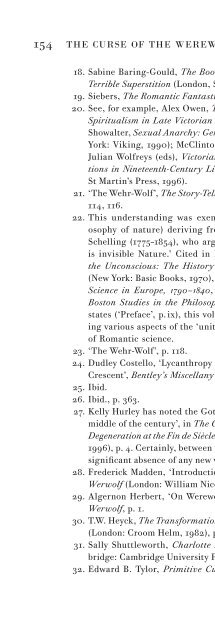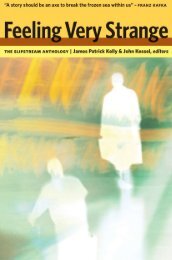The Curse of the Wer.. - Site de Thomas - Free
The Curse of the Wer.. - Site de Thomas - Free
The Curse of the Wer.. - Site de Thomas - Free
Create successful ePaper yourself
Turn your PDF publications into a flip-book with our unique Google optimized e-Paper software.
154 THE CURSE OF THE WEREWOLF<br />
18. Sabine Baring-Gould, <strong>The</strong> Book <strong>of</strong> <strong>Wer</strong>e-wolves: Being an Account <strong>of</strong> a<br />
Terrible Superstition (London, Smith & El<strong>de</strong>r, 1865), p. xii.<br />
19. Siebers, <strong>The</strong> Romantic Fantastic, pp. 23–4.<br />
20. See, for example, Alex Owen, <strong>The</strong> Darkened Room: Women, Power and<br />
Spiritualism in Late Victorian England (London: Virago, 1989); Elaine<br />
Showalter, Sexual Anarchy: Gen<strong>de</strong>r and Culture at <strong>the</strong> Fin <strong>de</strong> Siècle (New<br />
York: Viking, 1990); McClintock, Imperial Lea<strong>the</strong>r; Ruth Robbins and<br />
Julian Wolfreys (eds), Victorian I<strong>de</strong>ntities: Social and Cultural Formations<br />
in Nineteenth-Century Literature (London: Macmillan/New York:<br />
St Martin’s Press, 1996).<br />
21. ‘<strong>The</strong> Wehr-Wolf’, <strong>The</strong> Story-Teller, or Journal <strong>of</strong> Fiction, vol. 2 (1833), pp.<br />
114, 116.<br />
22. This un<strong>de</strong>rstanding was exemplified in <strong>the</strong> Naturphilosophie (philosophy<br />
<strong>of</strong> nature) <strong>de</strong>riving from <strong>the</strong> work <strong>of</strong> Friedrich Wilhelm von<br />
Schelling (1775–1854), who argued that ‘Nature is visible Spirit, Spirit<br />
is invisible Nature.’ Cited in Henri F. Ellenberger, <strong>The</strong> Discovery <strong>of</strong><br />
<strong>the</strong> Unconscious: <strong>The</strong> History and Evolution <strong>of</strong> Dynamic Psychiatry<br />
(New York: Basic Books, 1970), p. 202. See also Romanticism in Science:<br />
Science in Europe, 1790–1840, ed. Stefano Poggi and Maurizio Bossi,<br />
Boston Studies in <strong>the</strong> Philosophy <strong>of</strong> Science, vol. 152 (1994). As Bossi<br />
states (‘Preface’, p. ix), this volume is entirely <strong>de</strong>voted to essays exploring<br />
various aspects <strong>of</strong> <strong>the</strong> ‘unitary vision <strong>of</strong> <strong>the</strong> universe’ characteristic<br />
<strong>of</strong> Romantic science.<br />
23. ‘<strong>The</strong> Wehr-Wolf’, p. 118.<br />
24. Dudley Costello, ‘Lycanthropy in London; Or, <strong>the</strong> Wehr-Wolf <strong>of</strong> Wilton-<br />
Crescent’, Bentley’s Miscellany 38 (October 1855), p. 366.<br />
25. Ibid.<br />
26. Ibid., p. 363.<br />
27. Kelly Hurley has noted <strong>the</strong> Gothic mo<strong>de</strong>’s ‘virtual disappearance in <strong>the</strong><br />
middle <strong>of</strong> <strong>the</strong> century’, in <strong>The</strong> Gothic Body: Sexuality, Materialism, and<br />
Degeneration at <strong>the</strong> Fin <strong>de</strong> Siècle (Cambridge: Cambridge University Press,<br />
1996), p. 4. Certainly, between <strong>the</strong> late 1850s and about 1875, <strong>the</strong>re was a<br />
significant absence <strong>of</strong> any new werewolf fiction.<br />
28. Fre<strong>de</strong>rick Mad<strong>de</strong>n, ‘Introduction’, in F. Mad<strong>de</strong>n (ed.), William and <strong>the</strong><br />
<strong>Wer</strong>wolf (London: William Nicol, Shakspeare-Press, 1832), p. xiii.<br />
29. Algernon Herbert, ‘On <strong>Wer</strong>ewolves’, in Mad<strong>de</strong>n (ed.), William and <strong>the</strong><br />
<strong>Wer</strong>wolf, p. 1.<br />
30. T.W. Heyck, <strong>The</strong> Transformation <strong>of</strong> Intellectual Life in Victorian England<br />
(London: Croom Helm, 1982), p. 50.<br />
31. Sally Shuttleworth, Charlotte Bronte and Victorian Psychology (Cambridge:<br />
Cambridge University Press, 1996), pp. 12–13.<br />
32. Edward B. Tylor, Primitive Culture: Researches into <strong>the</strong> Development





